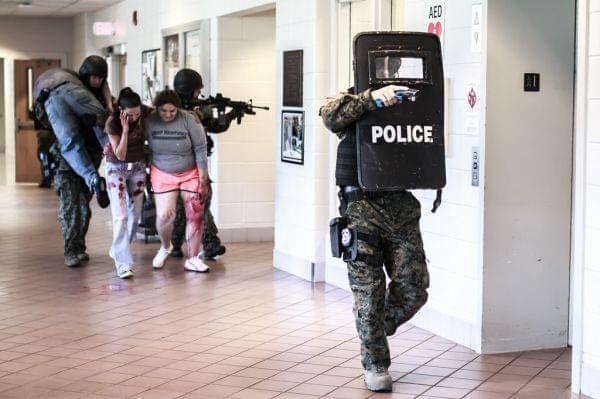Champaign Unit 4 Schools Will Conduct Active Shooter Drill Involving Students This Year

A change in Illinois law means K-12 students must participate in an active shooter drill within the first 90 days of the school year. In this photo, Paducah Police officers conduct an active-shooter mock exercise at West Kentucky Community and Technical College. "Safety Ahead" by MAMC Photography is licensed under CC BY-NC-SA 2.0
Champaign Unit 4 students will participate for the first time in active shooter drills this upcoming school year. The district is required under a new state law to involve students in the drills, and hold them within the first three months of the school year.
District staff will present an updated one-year crisis plan during a school board meeting scheduled for Monday, Aug 12. The district’s current plan, which Illinois Public Media obtained through a Freedom of Information Act request, includes unannounced active shooter drills.
But Champaign Unit 4 Superintendent Susan Zola said that’s going to change. She said that under the new plan, the active shooter drills will be announced in advance.
"Basically, for students and staff, it will feel a lot like a fire drill because they’ll be evacuating the building to a designated location where the teacher takes attendance," Zola said.
Zola said parents will be involved in the planning process for the district’s crisis plan moving forward.
The new state law allows school staff to exempt some students from the drills at their discretion. Zola said staff plan to discuss the drills with parents of students with individualized education plans and other special needs.
She said several district parents have told her they think the district should do more to prepare students in the event of an active shooter. As Illinois Newsroom reported last week, some parents in the Unit 4 district are concerned the active shooter drills may do more harm than good, particularly for students with trauma histories and special needs.
“I think there’s quite a continuum there and I think the board will have to weigh all those perspectives with making sure we’re obviously meeting the letter of the law," Zola said. "Those are the conversations that will happen over the next year.”
Follow Lee Gaines on Twitter: @LeeVGaines
